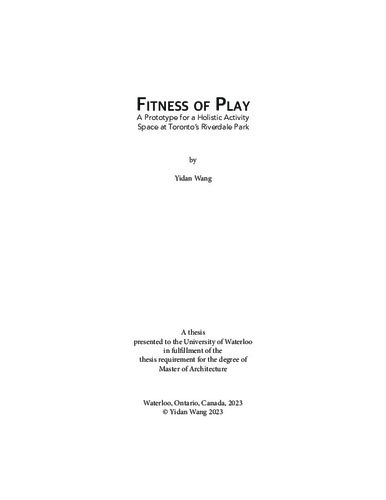| dc.contributor.author | Wang, Yidan | |
| dc.date.accessioned | 2023-01-10 16:48:50 (GMT) | |
| dc.date.available | 2023-01-10 16:48:50 (GMT) | |
| dc.date.issued | 2023-01-10 | |
| dc.date.submitted | 2023-01-09 | |
| dc.identifier.uri | http://hdl.handle.net/10012/19046 | |
| dc.description.abstract | The value of personal well-being and execution of fitness varies between individuals as the constant transformation of societal ideologies around fitness continually impact the macro perception. This in turn leaves the notion of fitness to lack stability and security. With the influence of visually stimulating exchanges through virtual interactions in the contemporary world, the body becomes a means of public expression and social identity that places a priority on certain physical and aesthetic conditions of the human body, rather than their degree of health, uniqueness and ability. With such backdrop, the contemporary notion of fitness that encapsulates ideas around a socially constructed ‘ideal’ becomes the motivational drive of physical exercise for many.
The body-obsessive fitness facilities catered towards a group at large reinforces these socially constructed values as it becomes the location for the production of the ill-defined ‘ideal’ bodies. The excessive mechanical rigidity and spatial linearity of the fitness floor plans generates a mechanical notion of strength and power; gym equipment and machines that limit the amount of self-induced movements produce robotic and mindless movements; all of which emanate an intimidating and isolating milieu that dismisses the importance of emotional well-being, playful social interactions and a synergy of the mind and body.
The first portion of this thesis examines the fluid nature of fitness culture and the effect of technology and media on promulgating ideas around fitness, as well as its subsequent impact on the socio-spatial realm of fitness facilities and its users. The second portion of this thesis explores the values and elements of play while referring to various built precedents that physically and psychologically constitutes a playful environment in favour of reimagining the relationship between exercise and play. Finally, the third portion of this thesis introduces a speculative proposal located at Toronto’s Riverdale Park which redefines the contemporary act of exercise by providing an all-inclusive play-scape rather than imposing rigid exercises found at a gym. The proposed environment utilizes notions of play to penetrate an individual’s preconceived notions of fitness to provoke changes in understanding what it means to be healthy and fit, and reclaim the connection of the mind and body, to nature, to play, and to others. | en |
| dc.language.iso | en | en |
| dc.publisher | University of Waterloo | en |
| dc.subject | activity space | en |
| dc.subject | fitness | en |
| dc.subject | play | en |
| dc.subject | playful design | en |
| dc.subject | exercise playground | en |
| dc.subject | activity landscape | en |
| dc.subject | Toronto | en |
| dc.subject | prototype | en |
| dc.subject | well-being | en |
| dc.subject | mindfulness | en |
| dc.subject | nature | en |
| dc.subject | mind-body | en |
| dc.subject | mind-body connection | en |
| dc.title | Fitness of Play: A Prototype for a Holistic Activity Space at Toronto’s Riverdale Park | en |
| dc.type | Master Thesis | en |
| dc.pending | false | |
| uws-etd.degree.department | School of Architecture | en |
| uws-etd.degree.discipline | Architecture | en |
| uws-etd.degree.grantor | University of Waterloo | en |
| uws-etd.degree | Master of Architecture | en |
| uws-etd.embargo.terms | 0 | en |
| uws.contributor.advisor | Andrighetti, Rick | |
| uws.contributor.affiliation1 | Faculty of Engineering | en |
| uws.published.city | Waterloo | en |
| uws.published.country | Canada | en |
| uws.published.province | Ontario | en |
| uws.typeOfResource | Text | en |
| uws.peerReviewStatus | Unreviewed | en |
| uws.scholarLevel | Graduate | en |

